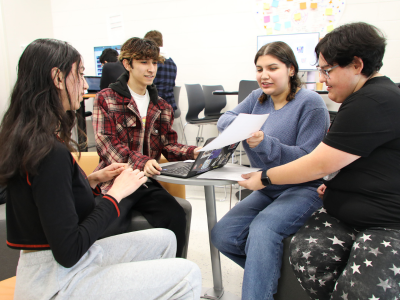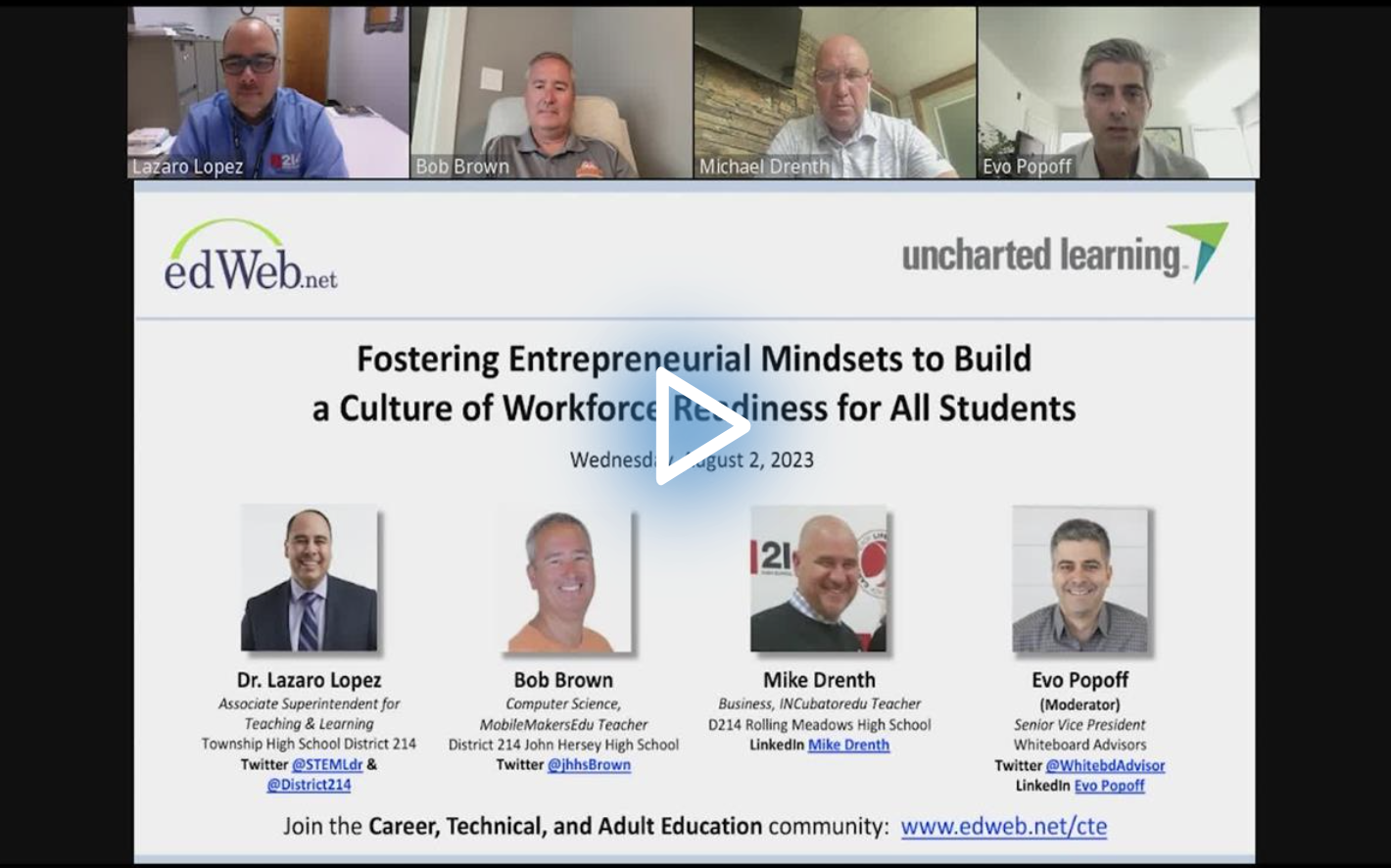Getting Students Career Ready
Watch the RecordingListen to the Podcast
It’s more important than ever to equip students with the tools they need to succeed in a rapidly evolving work world. Creativity, flexibility, communication, and problem solving are among the most highly touted skills in the workplace today, yet they are often left out of the traditional K-12 curriculum.
What would it look like to create a school culture that prioritizes developing these capabilities for all students? In the edLeader Panel “Fostering Entrepreneurial Mindsets to Build a Culture of Workforce Readiness for All Students,” educators from Township High School District 214 (IL) described how teaching entrepreneurial skills to students bolsters career readiness.
A Shift in Thinking
Typically, schools follow a college-to-career trajectory, emphasizing academics. Yet not all students are on a college track. Some students seek other options after high school, often job related.
Flipping the pathway—career to college—prepares students for the workforce while in school, developing essential workplace skills and qualities, including analytical and creative thinking, resilience and flexibility, motivation and self-awareness, curiosity and lifelong learning, and technological literacy.
District 214 adopted the flipped approach to support students’ career readiness across its six high schools. Its tagline is “Discover your future,” reflecting its vision of being future ready. It’s about increasing postsecondary readiness, persistence, and completion, regardless of a student’s direction.
Entrepreneurship Education: Real-World Job Experience
There is a strong connection between the skills developed in entrepreneurship education and workplace readiness skills and mindset. Through its classroom entrepreneurship programs, District 214 helps build students’ skillsets to be competitive after high school.
Mike Drenth, a business education teacher at District 214’s Rolling Meadows High School, teaches the INCubatoredu entrepreneurship program. Students are engaged in a yearlong development of a business idea. Working in teams, they begin with conceptualization, ideation, and customer discovery, then test, validate, and iterate the components of their business model canvas.
Coaches (such as marketers, lawyers, and accountants) teach the students lessons centered on their professional experiences and discuss varied career topics. Mentors work with the groups once every few weeks to check on their in market progress.
At the end of the school year, there is a school pitch night—similar to Shark Tank—where students pitch their business ideas to judges. Each district high school has several teams, from which one team is selected per school to participate in a district pitch night. If their business concept wins, they receive seed money ($2,500 to $3,500) to launch it.
Bob Brown, a John Hersey High School teacher, teaches a mobile apps development class using MobileMakersEdu. Students build working apps for Apple’s mobile devices using professionals’ Swift and Xcode coding language and tools.
In the program, students create apps beginning with a simple “Hello World” app and then develop more complex apps throughout the year. Throughout the course, students become familiar with presenting material, showing an image or text, getting a button to activate something, or going from one page to the next.
In the year’s final quarter, students participate in a Shark Tank-like event where they develop app ideas. They then engage in agile development using a scrub board and work through sprints to take the concept through to implementation.
At the end of the year, the district holds a showcase for all six high schools where students present their apps to peers, staff, parents, and other school community stakeholders.
The Benefits Are Substantial
Dr. Lazaro Lopez, District 214 Associate Superintendent for Teaching and Learning, explained that the student-centric approach in the INCubatoredu and MobileMakersEdu mobile apps programs grew enrollment in AP Computer Science and business classes tenfold, with about 1,200-1,500 students per pathway.
Through the programs, said Dr. Lazaro, students can do something they never imagined they could. The programs are empowering, allowing students to discover and pursue their passions.
Overall, the programs create a class of students who walk across the stage at graduation more prepared and informed to make good decisions for themselves.
Learn more about this edWeb broadcast, Fostering Entrepreneurial Mindsets to Build a Culture of Workforce Readiness for All Students, sponsored by Uncharted Learning, NFP.
Watch the RecordingListen to the Podcast
Join the Community
Career, Technical, and Adult Education is a free professional learning community where educators, community leaders, and other stakeholders can share information about helping students and adults acquire the academic and technical skills needed for high-skill, high-wage, and high-demand occupations in the 21st century economy.

Blog post by Michele Israel, based on this edLeader Panel





Comments are closed.